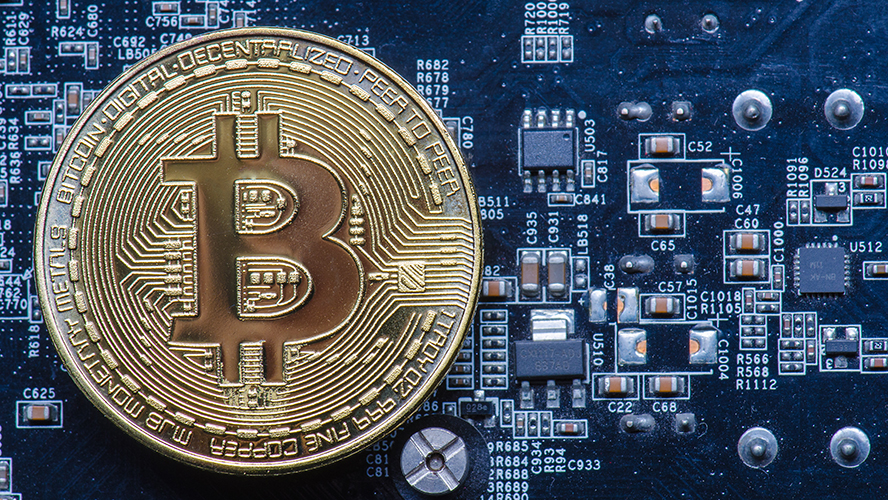The IRS has been increasingly active in its effort to ensure that virtual currency does not become a tool for tax evasion. This is not surprising, given that—as we started the last month of 2020—the value of Bitcoin, by far the most well-known cryptocurrency in the world, reached its highest level since 2017. Between June 2019 and July 2020, about 3.1 million active accounts were estimated to use bitcoin in the U.S.

Guidance
The IRS first started publishing guidance and notices on the federal income tax treatment of virtual currency in 2014. The first one among many was Notice 2014-21, which concluded that convertible virtual currency (virtual currencies that can be used to make purchases in the real economy and can be converted into government-issued currencies) should be treated as property for tax purposes. The next Notice, Rev. Rul. 2019-24, addressed the tax treatment of more specific types of virtual currency transactions, “hard fork” and “airdrop.” The IRS has also posted answers to frequently asked questions about virtual-currency transactions on its website. Starting with taxable year 2019, the IRS revised Schedule 1 to Form 1040 to require taxpayers to identify whether they engaged in any transaction involving virtual currency. The IRS plans on going even further as shown in a released draft of the revised Form 1040 for 2020, where it proposed placing the question about cryptocurrencies in a very prominent location—immediately below the taxpayer’s name and address.
More guidance might be forthcoming. One issue is whether the rules for broker reporting should apply to cryptocurrency transactions in the same way that they apply to trades in stocks and securities. The IRS believes that increased reporting leads to greater compliance. Earlier this year, the Chamber of Digital Commerce (the “Chamber”) submitted a comment letter to the IRS and the Department of Treasury to provide its views on potential forthcoming guidance on the reporting issue. The letter pointed out there is still some lack of clarity on the tax information reporting requirement for digital asset transactions, and that further instruction is needed for taxpayers to accurately interpret existing tax rules in the digital currency context. Some of the key areas on which the Chamber had requested clarification are: how “broker” is defined in the virtual currency context—which is critical for analyzing basis reporting requirements and certain information return filing obligations—and what factors are relevant for determining the location transactions take place, which can be a critical factor for cross-border transactions.
Enforcement Efforts
At the same time that it has been providing such guidance, the IRS has begun efforts to investigate possible tax evasion using virtual currency. The agency started its enforcement efforts in as early as 2016 when it served a “John Doe” Summons on one of the largest cryptocurrency exchanges in the country. The IRS demanded that the exchange produce a wide range of taxpayer identifying information and historical transaction records, and when the exchange refused to comply, the U.S. District Court for the Northern District of California ordered the exchange to turn over taxpayer information for those who conducted transactions worth more than $20,000 on its platform for the 2013 – 2015 period.
As part of its virtual currency compliance campaign announced in 2018 to address tax noncompliance related to virtual currency, in 2019 and again in 2020, the IRS sent thousands of warning letters to cryptocurrency holders whose tax returns did not match their virtual currency transaction records. While the IRS has not made it clear where it obtained the information about taxpayers’ transactions, one possible source of data could be Form 1099 reports from virtual currency exchanges. The IRS sent three different types of letters, varying in severity. The first type, Letter 6173, raised the possibility of an examination or enforcement activity if the taxpayer didn’t respond by a specific date and noncompliance persists. The other two, Letters 6174 and 6174-A, reminded taxpayers of their obligation to report.
According to the Internal Revenue Manual (IRM 5.1.18.20.3 (7-17-19)), the IRS uses normal investigative techniques to identify virtual currency including interviews, bank or credit card analysis, summonses of exchanges and financial institutions, review of Forms 1099-K, review of FinCEN Query reports, tracking and internet searches. While this set of instructions may appear relatively old-fashioned, the IRS’ latest moves demonstrate that it is upgrading its crypto-investigation toolbox. According to published reports, in September 2020, the IRS spent approximately $250,000 on a contract with Blockchain Analytics and Tax Services LLC, which will give the IRS access to blockchain analysis tools to track cryptocurrency transactions. Earlier in the summer, the IRS also signed a deal to purchase access to certain blockchain-tracing software for a year.
Despite the industrywide complaint that the IRS’s expectations with regards to holders of virtual currency are vague and unclear, this year, the IRS and the Department of Justice have started taking more proactive actions to prosecute taxpayers who allegedly committed a greater scale of tax evasion related to the use and trade of virtual currency. In October 2020, the Department of Justice charged software pioneer John McAfee with alleged evasion of tax by using cryptocurrency. In addition, on December 9, 2020, the SEC charged Amir Bruno Elmaani, founder of cryptocurrency called Oyster Pearl, with tax evasion. Elmaani allegedly evaded tax on millions of dollars of profits from cryptocurrency transactions and using shell companies and pseudonyms to conceal his income.
Increasing Regulation and Enforcement
All indications are that regulation and enforcement of the law with respect to virtual currency is increasing. On the regulatory side, earlier this month, a new U.S. congressional bill called the “Stablecoin Tethering and Bank Licensing Enforcement Act” was introduced that aims to regulate digital currencies by requiring certain digital currency issuers to obtain a banking charter and obtain approval from the Federal Reserve. Different government agencies are working in parallel to clarify tax payment and reporting obligations with respect to cryptocurrency, and the latest movements indicate that the enforcement actions are continuing.
We expect to see more enforcement actions in the upcoming administration. In November, the president-elect Joe Biden appointed Gary Gensler, a former Commodity Futures Trading Commission Chair under the Obama administration, to its presidential transition team. Gensler has testified before Congress about virtual currency and blockchain on several occasions, and while little information is known about Biden’s stance on cryptocurrency, Gensler called blockchain technology a “change catalyst” in a 2019 CoinDesk opinion and is generally considered to be “Bitcoin-friendly.” While it is generally unclear what Gensler’s long-term official position under the Biden administration will be, he is also on top of a list of potential picks for the SEC chair. Another clue that may provide some insight with regards to Gensler’s attitude towards cryptocurrency is his 2019 statement that Facebook’s proposed digital token, Libra, should be treated as a “security,” which establishes the basis for increasing regulatory oversight. (Cryptocurrency’s uncertain status as a security for tax purposes raises other tax issues.) The general industry consensus is that, while there is a growing acceptance of the legitimacy of cryptocurrency, it is likely that more regulatory and enforcement actions will continue by the SEC against issuers and intermediaries, and by the IRS against taxpayers. More regulation is not necessarily negative—it can create clearer guidelines and landscape for exchanges and virtual currency holders and enable them to better understand the regulatory and tax authorities’ expectations. That being said, it will be important for exchanges and taxpayers to closely follow the latest government guidelines with respect to virtual currency and ensure they comply with reporting and tax payment obligations.







